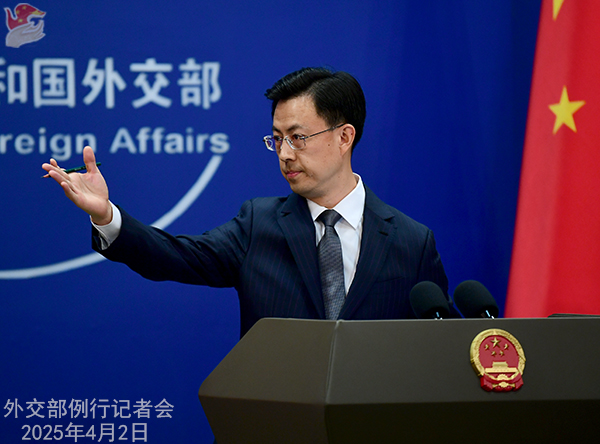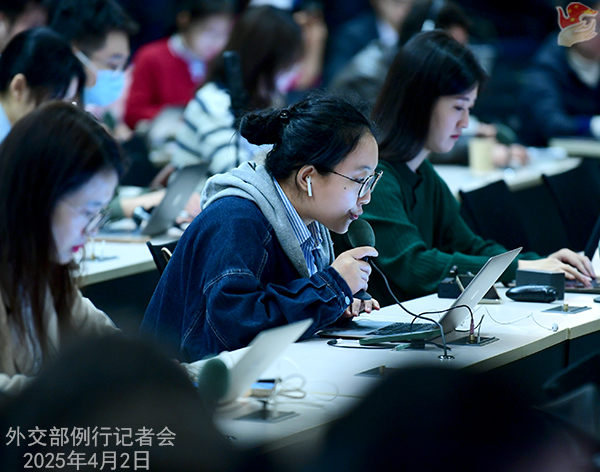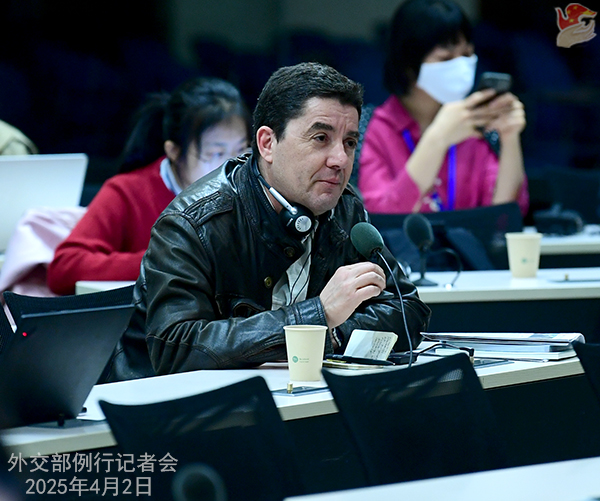
CCTV: It’s reported that the U.S., EU, Japan and some others made remarks on the joint exercises around Taiwan Island conducted by the People’s Liberation Army on April 1. They oppose unilateral changes to the status quo, including through force or coercion, and said that there is no justification for China’s irresponsible threats and military pressure operations near Taiwan. What’s China’s comment?
Guo Jiakun: The accusation of a handful of countries and organizations against China is a mischaracterization of the facts and truth and an interference in China’s internal affairs. China deplores and opposes this. The Taiwan question is purely China’s internal affairs that brook no external interference. “Taiwan independence” separatist activities and external forces that abet and aid them are the ones that undermine peace and stability across the Taiwan Strait. If certain countries and organizations truly want peace and stability across the Taiwan Strait, they should follow the prevailing trend of international commitment to the one-China principle, abide by their political commitments made to China, earnestly respect China’s sovereignty and territorial integrity, and oppose “Taiwan independence” in any form.
Moves to clamor for “Taiwan independence” mean separating China, support for “Taiwan independence” means interference in China’s internal affairs, and attempts to abet “Taiwan independence” mean destabilizing the Taiwan Strait. China’s joint exercises is a severe punishment against the Lai Ching-te authorities’ aggressive provocation to seek “Taiwan independence,” a stern warning to “Taiwan independence” separatist forces who deliberately undermine peace across the Taiwan Strait, and a responsible move to defend national sovereignty, security and territorial integrity. No external force is in any position to point fingers at this.
As long as provocations for “Taiwan independence” last, our punishment against “Taiwan independence” will continue. We will never ever allow anyone or any force to separate Taiwan from China in any form. We will take all measures necessary to firmly safeguard national sovereignty and territorial integrity.
Bloomberg: Regarding reports that soldiers in Myanmar opened fire on a convoy of vehicles carrying relief supplies for the Chinese Red Cross. These were made for earthquake victims in Mandalay. Can the Foreign Ministry confirm if this is accurate and, if so, provide some further details?
Guo Jiakun: China and Myanmar are neighbors that share “pauk-phaw” friendship. Immediately after Myanmar was hit by the earthquake, China launched an emergency response with an all-out search and rescue operation. The relief supplies provided by the Red Cross Society of China have already arrived in Myanmar and are being transported to disaster-stricken areas in Mandalay. The rescue team and relief supplies are safe at present.
Saving lives is the top priority. It is imperative for us to do everything we can to respond to the disaster. China sincerely hopes that all ethnic groups and factions in Myanmar can work as one to overcome difficulties together. We strongly urge all parties in Myanmar to ensure the safety and security of rescuers and supplies from China and other countries, and keep logistics corridors fully accessible. China stands ready to do everything we can to provide relief and support to affected regions in light of the need of Myanmar.
Kyodo News: It’s reported that the ROK constitutional court will decide on April 4 whether to dismiss President Yoon Suk Yeol. Given the ongoing turbulence in the ROK and the upcoming APEC summit to be held in the ROK this fall, what impact do you think the court’s ruling will have on China-ROK diplomacy?
Guo Jiakun: We noted the reports. As we’ve stressed more than once, China follows the principle of non-interference in other countries’ internal affairs, will not comment on the ROK’s domestic situation and believes that the ROK people have the wisdom and capability of properly handling their domestic issues. As an important neighbor and cooperation partner, China stands ready to work with the ROK to make active effort in deepening friendly cooperation and strategic cooperative partnership between the two countries.
Reuters: Also to do with the Myanmar junta and the shots fired at the convoy. We would like to ask what happened because the junta said right before this press conference that the Chinese Red Cross did not inform the government of it being in a conflict zone. Also, our question is, would China consider sending any security to protect its Chinese humanitarian personnel there or consider temporarily stopping delivery of aid?
Guo Jiakun: After Myanmar was hit by the earthquake, various parties, including the Red Cross Society of China, announced that they will provide relief supplies to Myanmar. As I just said, the relief supplies provided by the Red Cross Society of China have already arrived in Myanmar and are being transported to disaster-stricken areas in Mandalay. The rescue team and relief supplies are safe at present. We also hope that all ethnic groups and factions in Myanmar can take disaster relief as the main task, ensure the safety and security of rescuers and supplies from China and other countries, and keep logistics corridors fully accessible.
AFP: The U.S. State Department said yesterday that it had approved the possible sale of F-16 jets to the Philippines. Would the Foreign Ministry like to comment on this?
Guo Jiakun: We’ve made clear more than once our position on military and security cooperation between the Philippines and the U.S. Defense or security cooperation between the Philippines and other countries should not target any third party or harm their interest, still less threaten regional peace and security or escalate tensions in the region. Who exactly is fueling the flames? Who exactly is instigating military confrontation? Who exactly is turning Asia into a “powder keg?” Regional countries are not blind.

Beijing Youth Daily: A recent report issued by the International Renewable Energy Agency (IRENA) shows that global renewable power capacity grew by a record 585 gigawatts in 2024, representing 92.5 percent of all new power added worldwide. Sixty percent of the global added capacity was contributed by China. The Spokesman for the United Nations Secretary-General recently commended China’s contribution to international renewable energy development. Under the current international circumstances, will China continue to contribute to global green transformation? What effort will China make in this regard?
Guo Jiakun: China’s commitment to green and low-carbon development is an inherent requirement of its pursuit of high-quality economic growth, which also serves as a driving force for global climate response and sustainable development.
In 2024, four out of every 10 kilowatt-hour of electricity in China was generated by clean energy. As the largest exporter of clean technologies, China creates 46 percent of the job opportunities in the global renewable energy industry. According to another report from IRENA, over the past decade the average cost per kilowatt-hour of global wind power projects has decreased by more than 60 percent, and that of PV power projects by more than 80 percent. The reductions are largely attributable to China’s efforts.
In China’s cooperation with neighboring countries for sustainable development, “green transition” and “blue contributions” stand out. China has conducted cooperation with Viet Nam, Thailand and other countries on clean energy, signed cooperation documents on blue economy with Indonesia, among other countries, and promoted cooperation in relevant fields.
Building a clean and beautiful world is the shared responsibility of all countries. Some countries are now groundlessly going after China’s green sector, which will lead to self-isolation, and even worse, cost the international community and developing countries more to access renewable energy, and hinder global green and low-carbon development. China will continue to work with other parties, empower development through green transition, and promote cooperation on blue economy. We also call on all parties to jointly create favorable conditions for international green cooperation and make greater contributions.
AFP: The Philippines’ military chief said yesterday that the Philippines would inevitably be involved if there were a conflict over Taiwan. He also said that China was actively infiltrating Philippine institutions, including the military. Would the Foreign Ministry like to respond to these comments?
Guo Jiakun: The Taiwan question is China’s internal affair and is at the core of China’s core interest. Resolving the Taiwan question is a matter for the Chinese ourselves that no one can interfere in. We urge certain people in the Philippines to refrain from making provocations and playing with fire on the Taiwan question. Those who play with fire will perish by it. We also oppose relevant personnel calling white black and making groundless accusations.
AFP: Final one on the Philippines. The Chinese Embassy in the Philippines yesterday put out a notice warning that Philippine law enforcement has been harassing Chinese citizens and businesses. Can you provide any information on this and specifically what kind of harassment or other activities China is worried about in the Philippines?
Guo Jiakun: Given what happened recently regarding travel safety in the Philippines, the Chinese Embassy in the Philippines issued a security alert. There is much relevant media coverage, which you may refer to.
O Globo: Last week, it was confirmed that President Dilma Rousseff stayed as President of the New Development Bank for five more years. Can you comment on why China supports the extension of the tenure?
Guo Jiakun: China congratulates Mrs. Dilma Rousseff on staying on as President of the New Development Bank. We also appreciate the important role that the New Development Bank has played in promoting relevant development and cooperation. China will, as usual, continue to support President Dilma Rousseff in fulfilling her duty and the New Development Bank in playing a greater role.
